News
Annual Conference of Europe's Labour Economists in Prague
22 September, 2023
CERGE-EI was the proud organizer of the 35th International Annual Conference of the European Association of Labor Economists (EALE) which took place at the Faculty of Law, Charles University between 21-23 September, 2023.
EALE promotes the advancement of knowledge in the field of labour economics in Europe and elsewhere. Hundreds of labor economists from across Europe are now in Prague to share the latest in their research.
Day 1: Following registration and a welcome coffee the conference started on 21 September with a welcome by EALE President Michèle Belot, Professor of Industrial and Labor Relations and Professor of Economics at Cornell University, and an opening speech by Jan Švejnar, co-founder of CERGE-EI and Director of the Center on Global Economic Governance and Professor of International and Public Affairs at Columbia University, who spoke about the CEE region research outcomes and labour market outcomes from CEECs in international comparison. Uta Schönberg, Professor of Economics at University College London then gave a keynote speech about knowledge spillovers via training also to non-trained colleagues. The program then continued with the first poster session and 14 parallel sessions which typically contain 3 or 4 short (15 minute) presentations on a wide range of topics, including, among others: Migration, Unions, Retirement, Employment Protection, Gender, Crime and Education. The day then concluded with an informal welcome reception.
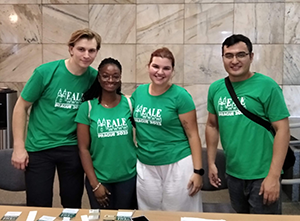
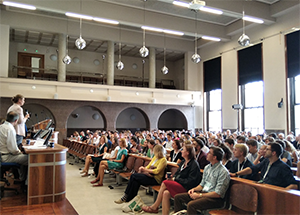
Day 2 of th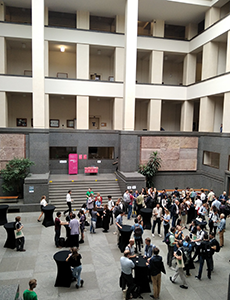 e event opened with a job market breakfast where seasoned researchers offered advice to job market candidates in the Labour Economics field, followed by another round of parallel sessions on topics as diverse as environmental issues, automation and technology, mobility, personnel economics, health, covid and consequences of job loss.
e event opened with a job market breakfast where seasoned researchers offered advice to job market candidates in the Labour Economics field, followed by another round of parallel sessions on topics as diverse as environmental issues, automation and technology, mobility, personnel economics, health, covid and consequences of job loss.
Before lunch, participants enjoyed a discussion over research highlights presented in another poster session. Friday afternoon was dedicated to job market sessions as well as more parallel sessions covering topics such as job search, unemployment, job satisfaction and wellbeing, education, gender gaps and family.
The formal program of the day concluded with a presidential address by Michèle Belot who gave an overview of the most recent research advancements on workers and jobs matching. The conference participants then enjoyed guided theme city tours to find out about Prague architecture, the legacy of communism, the world of Franz Kafka, and to explore the historical streets of the Lesser Town of Prague.
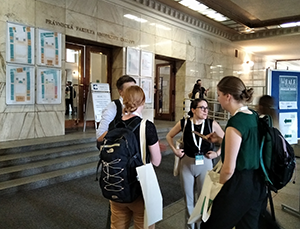
Day 3 of the conference opened with another round of parallel sessions focusing on issues including occupation choice and intergenerational mobility next to further look into some previously featured topics such as education, wage inequality, policy or gender gaps. Following the third and last poster session of the conference, Saturday then featured three flash talk sessions on the following themes: job search in the 21st century (7 short presentations put together by Didier Fouarge); the role of firms in the labor market (6 short presentations put together by Anna Raute), and unemployment (7 short presentations put together by Nikolas Mittag).
The afternoon of Day 3 included more parallel sessions with a focus on topics such as policy evaluation, wage inequality, labor demand, minimum wages and discrimination. After that, the floor was given to the second keynote speech by Gordon B. Dahl, Professor of Economics at the University of California, San Diego. He gave a great talk on the important topic of integration of ethnically diverse children at schools. The conference concluded with an awards ceremony and a general assembly, followed by a dinner.
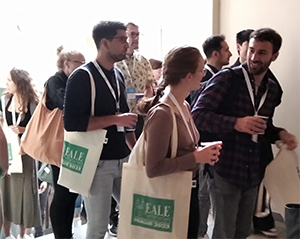 The conference in numbers:
The conference in numbers:
- 997 submissions of interest, of which 540 were accepted, and
around 450 registered
- 500 participants
- 94 parallel regular sessions - around 360 research presentations
- 3 poster sessions featuring over 60 poster presentations
- 3 parallel flash talk sessions featuring 20 presentations in all.
Selected program highlights:
Job Search in the 21st Century
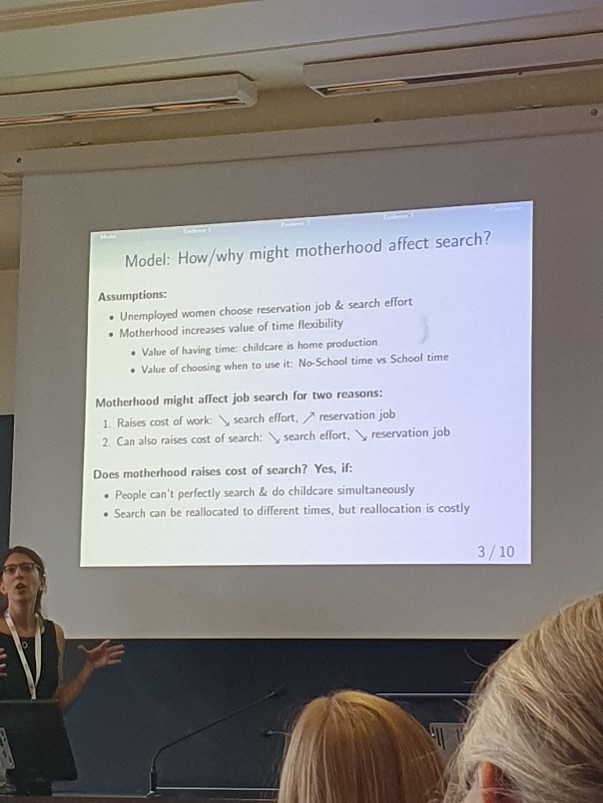 One of the topics covered by this year's EALE conference is job search in the 21st century. Labor market changes very fast and it is important that both firms and job seekers adjust to these changes. The policy question is how to facilitate these changes.
One of the topics covered by this year's EALE conference is job search in the 21st century. Labor market changes very fast and it is important that both firms and job seekers adjust to these changes. The policy question is how to facilitate these changes.
One of the challenges is (from the point of view of a worker) to find a job that matches one's skills and (from the point of view of a firm) to find employees that have the relevant skills. When workers and jobs match each other, the resulting employment relation is stable. As discussed in the presidential address by Michele Belot, new technologies might come helpful here. Belot described a project in which a job search platform provided automatically generated personalized suggestions about suitable alternative occupations to unemployed job seekers. Comparing job seekers involved in this program with those who do a usual job search shows that providing personalized suggestions helps job seekers find stable employment.
This topic was further discussed during a flash talk session featuring seven experts in the field. The general conclusion is that new technologies, and artificial intelligence in particular, can help job seekers and firms find each other in more effective way, can help unemployment agencies' worker give better advice, and direct unemployed job seekers to re-qualification courses that will help them find a job.
Diversity in the Classroom and Polarisation
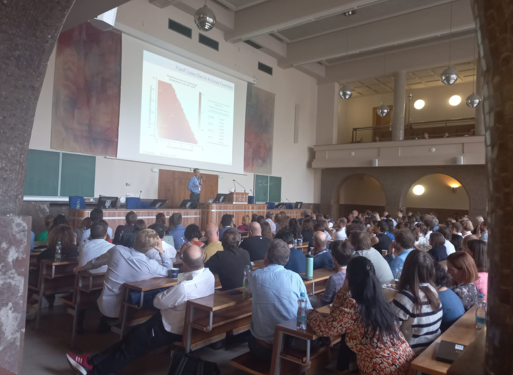 One of the Keynote Speeches at the conference was given by Gordon B. Dahl from University of California, San Diego. Dahl's research interests span a wide set of issues, including income and child achievement; peer effects among co-workers and family members; incarceration, recidivism and employment, and intergenerational links in welfare use.
One of the Keynote Speeches at the conference was given by Gordon B. Dahl from University of California, San Diego. Dahl's research interests span a wide set of issues, including income and child achievement; peer effects among co-workers and family members; incarceration, recidivism and employment, and intergenerational links in welfare use.
Gordon Dahl’s speech reflected upon an important topic of integration of ethnically diverse pupils at schools. His research suggests that there is a higher probability of successful integration in classrooms which are less polarized and more diverse. Prof. Dahl has shown that there exists some degree of discrimination of ethnic minorities based on stereotyping. In light of that, the largest success in children’s social integration happens if children interact more intensively with their classmates. This is plausible in the case where the classroom composition is not so polarized. Thus, for instance if there would be two larger ethnic groups in a classroom (large polarization), the chances of successful integration of children are much lower compared to a less polarized and more diverse classroom, i.e., one with a majority group and fewer children of the other ethnicity. It is natural for children of the same ethnicity to primarily interact with members of their own ethnic group. If the group is large enough then they have no need to interact with members of the other ethnic group. If the classroom is diverse, with one major ethnicity and a number of small ethnic groups, the children will much more likely interact with each other no matter their ethnicity.
This might offer important insights for Czech policy-makers, in particular regarding the recent large Ukrainian refugee wave. As we know, Czechia is the recipient of the largest volume of Ukrainian refugees per inhabitant. The majority of the refugees are mothers with children and so many Ukrainian children have joined the Czech schooling system. Dahl’s research suggests that for a smoother integration of children it would be preferable to distribute the Ukrainian refugees across classrooms, if possible, to avoid ethnically polarized environments.
Costs of Having Children and Parental Leave
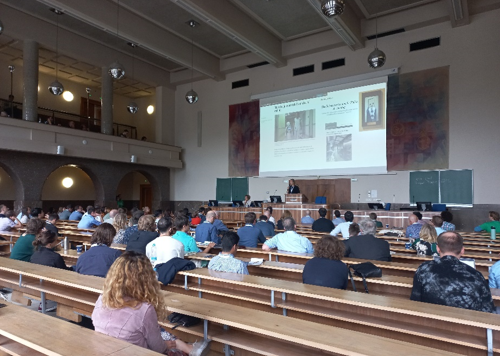
There is evidence from a wide range of countries that longer-family-leave policies have negative consequences for mothers as they are much more likely to take longer leave than fathers. This literature shows that mothers have worse labour market outcomes which recover only slowly when they get back to work, and the extent of these costs depends on the family leave policies of the countries. In particular, research on this topic on the Czech Republic, presented by Filip Pertold, shows that a more generous parental allowance has increased the time that mothers spend at home and has a strong negative impact on their employment later on.
While we know about these negative effects for mothers in terms of their earnings and labor market participation, several papers presented at EALE addressed relevant mechanisms which could be at the core of these costs of motherhood. One such mechanism is less time for job search for mothers: Daphne Skandalis and coauthors show that mothers in France who lost their jobs do less job search than mothers whose children spend less time at home, suggesting that childcare provision or a more equal split between the partners may also help jobless mothers to spend time on securing a future job.
An important dimension covered by this literature is indeed how childcare is shared between the parents. It is still the case that most of the parental leave is taken up by mothers, and recently, policies in the EU have tried to induce both partners to take parental leave. Research from Sweden has evaluated an alternative policy to incentivize joint childcare, which awarded parents a financial bonus for splitting the time more equally (with the highest bonus at the 50-50 split), increasing shared leave.
More about the program at https://eale2023prague.eu









